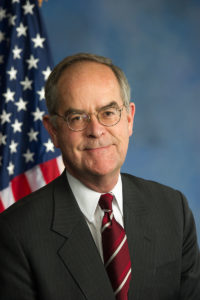Rep. Jim Cooper (D-Tenn.), a senior member of the House Armed Services Committee (HASC) and chair of the panel’s Strategic Forces Subcommittee, announced Tuesday he will not seek reelection in 2022.
Cooper is now the 29th House Democrat to decide against seeking another term, and he specifically cited Tennessee’s new congressional redistricting plan that split up his current district as a direct factor in his decision.

“Despite my strength at the polls, I could not stop the General Assembly from dismembering Nashville. No one tried harder to keep our city whole. I explored every possible way, including lawsuits, to stop the gerrymandering and to win one of the three new congressional districts that now divide Nashville. There’s no way, at least for me in this election cycle, but there may be a path for other worthy candidates,” Cooper said in a statement. “I am announcing my decision promptly so that others have more time to campaign. I will return the individual contributions that I have received for this race so that donors can redirect them as they choose.”
Cooper first served Tennessee’s 4th Congressional district from 1983 to 1995 and then reentered Congress in 2003 representing the state’s 5th Congressional district, spending time on the House Armed Services, Intelligence and Budget and Oversight Committees.
Currently, Cooper is HASC’s fourth-ranking Democrat and a key legislator on national security priorities for nuclear deterrence and space programs as chair of the Strategic Forces panel.
“As Chair of the Subcommittee on Strategic Forces, Congressman Cooper has played a key role in helping ensure the United States meets future threats, especially in space. The subcommittee he leads is responsible for shaping a range of important, sometimes contentious policy issues, and Congressman Cooper’s measured approach and commitment to reasonable debate and rational discussion has been incredibly valuable to the work of the Committee,” Rep. Adam Smith (D-Wash.), the HASC chair, said in a statement Tuesday.
With Rep. Jim Langevin (D-R.I.) having also announced his retirement last week, the next highest Democrat in terms of seniority on the Strategic Forces Subcommittee is currently Rep. John Garamendi (D-Calif.), who has been a proponent of taking a critical look at nuclear modernization spending (Defense Daily, Jan. 18).
Garamendi introduced a bill last June that would look to pause development of the future Ground Based Strategic Deterrent (GBSD) intercontinental ballistic missile until 2031 and instead focus on extending the service life of the Minuteman III missiles to 2040, as a means of potentially saving tens of billions of dollars for other priorities (Defense Daily, June 30 2021).
Cooper had long been a proponent of forming a Space Corps along with Rep. Mike Rogers (R-Ala.), the HASC ranking member, an idea that eventually gathered momentum into the recent formation of the U.S. Space Force.
“Now that the US Space Force has stood up, it is critical that we in Congress continue to oversee its implementation to ensure we are good stewards of taxpayer dollars. Maintaining space superiority while minimizing bureaucracy and keeping the force agile are critical objectives for this nascent branch of the military,” Cooper writes on his website.
Cooper also serves on HASC’s Seapower & Projection Forces Subcommittee and Intelligence, Emerging Threats & Capabilities Subcommittee, and is a member of the Blue Dog Coalition of moderate Democrats.